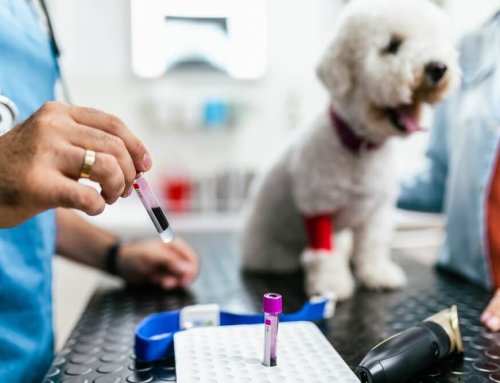Occasional coughing in pets can be normal, but a persistent or worsening cough is cause for concern. To help you make proactive care decisions and better understand your pet’s health, 360 Pet Medical has composed this guide to coughing in dogs and cats
When to see the veterinarian for your pet’s cough
First, you must be able to distinguish coughing from normal pet behaviors—if your cat’s cough is followed by a hairball, or your dog’s cough is actually a reverse sneeze, simply monitor them for worsening signs.
Schedule an appointment at 360 Pet Medical if your pet’s cough meets the following criteria:
- Progressive — The cough is increasing in frequency, changing in sound (i.e., harsh or wet), or disrupting your pet’s daily routine.
- Productive — The cough produces mucus-like discharge or fluid.
- Post-exercise — The cough occurs during or after physical exertion.
- Part of a bigger problem — Your pet’s cough is accompanied by weight loss, weakness, increased respiratory rate or effort, vomiting, or other clinical signs.
At your appointment, our veterinarians will ask specific questions about your pet’s cough and perform a complete physical examination, including an auscultation (i.e., stethoscope exam) of your pet’s heart, lungs, and airway. In some cases, additional diagnostic testing, such as digital X-rays, ultrasonography, blood work, or consultation with a veterinary specialist, may be recommended.
Common causes for coughing in pets
Coughing can be the response to an infection, irritation, illness, or structural condition. Treatment recommendations will vary based on the diagnosis, but your pet’s veterinarian will discuss all the options, and help you make the best decision for your pet.
While your pet can cough for many additional reasons, here are the most common conditions seen at 360 Pet Medical:
- Viral infection in pets — Like humans, pets are susceptible to highly transmissible respiratory viruses. Bordetella bronchiseptica (i.e., kennel cough) and canine influenza are commonly transmitted where dogs are housed together, such as shelters, and boarding and grooming facilities. Bordetella causes a dry, hacking cough, while canine influenza most often includes a fever and nasal discharge. These contagious conditions are preventable with routine vaccinations, and treatable with antibiotics and supportive care.
Cats may cough in response to inflammation (i.e., bronchitis) caused by infectious feline viral rhinotracheitis or feline bordetella. Infections are self-limiting, and preventable with vaccination, but may lead to pneumonia in kittens and immunocompromised cats.
- Tracheal collapse in dogs — This structural abnormality is common in small- and toy-breed dogs, whose cartilage rings that comprise the trachea (i.e., windpipe) weaken and collapse. Rather than breathing easily, the airway is narrowed and partially obstructed, leading to irritation, which triggers the coughing reflex. Dogs with tracheal collapse experience worsening symptoms when they are excited, and when they pull on a leash. Medication may be used to help this condition, as well as switching to a harness for walks. However, severe cases often require surgical correction.
- Laryngeal paralysis in dogs —In laryngeal paralysis, the muscles and nerves that control the dog’s vocal cords weaken and prevent the airway from fully opening. When the dog inhales, the vocal cords get sucked into the airway, and create an air flow resistance, causing raspy, hoarse breathing sounds or panting. In severe cases, the vocal cords can obstruct the airway, causing panic and suffocation. Dogs with laryngeal paralysis require close monitoring to prevent overexertion or overheating—which may trigger collapse. Surgical correction is often advised.
- Heart disease in pets — When heart function is compromised, fluid backs up into the lungs and leads to a cough (i.e., congestive heart failure). In dogs, the cough is often accompanied by fatigue, exercise intolerance, or reduced social interaction, and increased respiratory rate and effort. Heart disease can affect the valves or the muscle, and affects approximately 10% of dogs and 15% of cats in the United States. When diagnosed early, medical management can improve quality of life. Unfortunately, clinical signs can be subtle and may be mistaken for age-related changes—often delaying treatment.

Cats may show no signs at all, and are less likely to experience a cough than dogs, so routine veterinary care and screening tests are essential for early detection.
- Heartworm disease in pets — Heartworm disease is transmitted through the bite of an infective mosquito, and can affect dogs and cats. When heartworm larvae enter the bloodstream, they migrate to the lungs and heart, where they mature into adult worms up to 12 inches in length. These worms cause damage and inflammation in the large lung vessels, and reduce the heart’s pumping ability—pets experience fatigue, exercise intolerance, and, in some cases, sudden death.
Heartworm disease is completely preventable with monthly preventives. While the disease is treatable in dogs, the process is expensive, painful, and lengthy. As no safe treatment is available for cats, prevention is essential.
- Cancer in pets — Rarely, coughing can be caused by primary lung or heart tumors, or metastatic cancer that has progressed to the lungs. Most often, other clinical signs, including weight loss, poor body condition, and changes in appetite and energy, are visible.
Coughing pets should see the veterinarian
If your pet’s cough is more than an occasional throat-clearing, schedule a 360 Pet Medical appointment by phone or online. Our skilled veterinarians and advanced diagnostic capabilities can determine the cause behind the cough, and help your pet breathe easier.








Leave A Comment